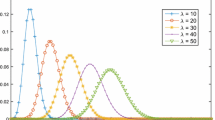Abstract
Effective workload distribution techniques can significantly reduce the total completion time of a program on grid computing environments. In this paper, we propose a dynamic performance-based workload partition approach for master-slave types of applications on grids. Furthermore, we implement two types of applications and conduct the experimentations on our grid testbed. Experimental results showed that our method could execute more efficiently than traditional schemes.
Preview
Unable to display preview. Download preview PDF.
Similar content being viewed by others
References
Divisible Load Theory, http://www.ee.sunysb.edu/~tom/MATBE/index.html
Global Grid Forum, http://www.ggf.org/
Introduction to Grid Computing with Globus, http://www.ibm.com/redbooks
KISTI Grid Testbed, http://Gridtest.hpcnet.ne.kr/
MPICH-G2, http://www.hpclab.niu.edu/mpi/
Network Weather Service, http://nws.cs.ucsb.edu/
Sun ONE Grid Engine, http://wwws.sun.com/software/Gridware/
TeraGrid, http://www.teraGrid.org/
The Globus Project, http://www.globus.org/
THU Bandwidth Statistics GUI, http://monitor.hpc.csie.thu.edu.tw/tiger/
Agrawal, R., Shafer, J.C.: Parallel Mining of Association Rules. IEEE Transactions on Knowledge and Data Engineering 8(6), 962–969 (1996)
Agrawal, R., Srikant, R.: Fast algorithms for Mining Association Rules. In: Proc. 20th Very Large Data Bases Conf., pp. 487–499 (1994)
Baker, M.A., Fox, G.C.: Metacomputing: Harnessing Informal Supercomputers. In: High Performance Cluster Computing. Prentice-Hall, Englewood Cliffs (1999)
Beaumont, O., Casanova, H., Legrand, A., Robert, Y., Yang, Y.: Scheduling Divisible Loads on Star and Tree Networks: Results and Open Problems. IEEE Transactions on Parallel and Distributed Systems 16(3), 207–218 (2005)
Bharadwaj, V., Ghose, D., Mani, V., Robertazzi, T.G.: Scheduling Divisible Loads in Parallel and Distributed Systems. IEEE Press, Los Alamitos (1996)
Bharadwaj, V., Ghose, D., Robertazzi, T.G.: Divisible Load Theory: A New Paradigm for Load Scheduling in Distributed Systems. Cluster Computing 6(1), 7–18 (2003)
Cheng, K.-W., Yang, C.-T., Lai, C.-L., Chang, S.-C.: A Parallel Loop Self-Scheduling on Grid Computing Environments. In: Proceedings of the 2004 IEEE International Symposium on Parallel Architectures, Algorithms and Networks, KH, China, May 2004, pp. 409–414 (2004)
Comino, N., Narasimhan, V.L.: A Novel Data Distribution Technique for Host-Client Type Parallel Applications. IEEE Transactions on Parallel and Distributed Systems 13(2), 97–110 (2002)
Drozdowski, M., Lawenda, M.: On Optimum Multi-installment Divisible Load Processing in Heterogeneous Distributed Systems. In: Cunha, J.C., Medeiros, P.D. (eds.) Euro-Par 2005. LNCS, vol. 3648, pp. 231–240. Springer, Heidelberg (2005)
Foster, I., Karonis, N.: A Grid-Enabled MPI: Message Passing in Heterogeneous Distributed Computing Systems. In: Proc. 1998 SC Conference (November 1998)
Foster, I., Kesselman, C., Tuecke, S.: The Anatomy of the Grid: Enabling Scalable Virtual Organizations. International J. Supercomputer Applications 15(3) (2001)
Foster, I., Kesselman, C.: Globus: A Metacomputing Infrastructure Toolkit. International J. Supercomputer Applications 11(2), 115–128 (1997)
Foster, I.: The Grid: A New Infrastructure for 21st Century Science. Physics Today 55(2), 42–47 (2002)
Foster, I., Kesselman, C. (eds.): The Grid: Blueprint for a New Computing Infrastructure, 1st edn. Morgan Kaufmann, San Francisco (1999)
Han, J., Kamber, M.: Data Mining: Concepts and Techniques. Morgan Kaufmann Publishers, San Francisco (2001)
Hummel, S.F., Schonberg, E., Flynn, L.E.: Factoring: a method scheme for scheduling parallel loops. Communications of the ACM 35, 90–101 (1992)
Li, H., Tandri, S., Stumm, M., Sevcik, K.C.: Locality and Loop Scheduling on NUMA Multiprocessors. In: Proceedings of the 1993 International Conference on Parallel Processing, vol. II, pp. 140–147 (1993)
Polychronopoulos, C.D., Kuck, D.: Guided Self-Scheduling: a Practical Scheduling Scheme for Parallel Supercomputers. IEEE Trans. on Computers 36(12), 1425–1439 (1987)
Robertazzi, T.G.: Ten Reasons to Use Divisible Load Theory. Computer 36(5), 63–68 (2003)
Shih, W.-C., Yang, C.-T., Tseng, S.-S.: A Performance-Based Parallel Loop Self-Scheduling on Grid Environments. In: Jin, H., Reed, D., Jiang, W. (eds.) NPC 2005. LNCS, vol. 3779, pp. 48–55. Springer, Heidelberg (2005)
Shih, W.-C., Yang, C.-T., Tseng, S.-S.: A Hybrid Parallel Loop Scheduling Scheme on Grid Environments. In: Zhuge, H., Fox, G.C. (eds.) GCC 2005. LNCS, vol. 3795, pp. 370–381. Springer, Heidelberg (2005)
Smarr, L., Catlett, C.: Metacomputing. Communications of the ACM 35(6), 44–52 (1992)
Tzen, T.H., Ni, L.M.: Trapezoid self-scheduling: a practical scheduling scheme for parallel compilers. IEEE Transactions on Parallel and Distributed Systems 4, 87–98 (1993)
Yang, C.-T., Chang, S.-C.: A Parallel Loop Self-Scheduling on Extremely Heterogeneous PC Clusters. Journal of Information Science and Engineering 20(2), 263–273 (2004)
Yang, C.-T., Cheng, K.-W., Li, K.-C.: An Efficient Parallel Loop Self-scheduling on Grid Environments. In: Jin, H., Gao, G.R., Xu, Z., Chen, H. (eds.) NPC 2004. LNCS, vol. 3222, pp. 92–100. Springer, Heidelberg (2004)
Zaki, M.J.: Parallel and Distributed Association Mining: A Survey. IEEE Concurrency 7(4), 14–25 (1999)
Banino, C., Beaumont, O., Carter, L., Ferrante, J., Legrand, A., Robert, Y.: Scheduling strategies for master-slave tasking on heterogeneous processor platforms. IEEE Transactions on Parallel and Distributed Systems 15(4), 319–330 (2004)
Author information
Authors and Affiliations
Editor information
Editors and Affiliations
Rights and permissions
Copyright information
© 2006 Springer-Verlag Berlin Heidelberg
About this paper
Cite this paper
Shih, WC., Yang, CT., Tseng, SS. (2006). A Performance-Based Approach to Dynamic Workload Distribution for Master-Slave Applications on Grid Environments. In: Chung, YC., Moreira, J.E. (eds) Advances in Grid and Pervasive Computing. GPC 2006. Lecture Notes in Computer Science, vol 3947. Springer, Berlin, Heidelberg. https://doi.org/10.1007/11745693_8
Download citation
DOI: https://doi.org/10.1007/11745693_8
Publisher Name: Springer, Berlin, Heidelberg
Print ISBN: 978-3-540-33809-3
Online ISBN: 978-3-540-33810-9
eBook Packages: Computer ScienceComputer Science (R0)




